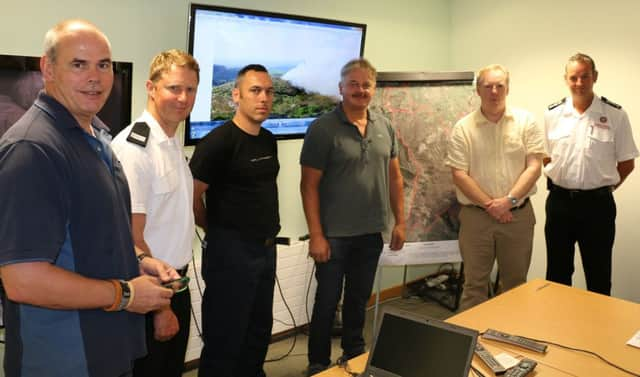'˜Operation WildFire' to investigate arsons


Operation WildFire brings together experts from the Northern Ireland Environment Agency (NIEA) the PSNI and the Northern Ireland Fire and Rescue Service (NIFRS) to investigate in more depth a number of the recent wildfires.
They will be assisted by a team of international wildfire investigators from the European Forest Institute and European Forest Risk Facility (FRISK).
Advertisement
Hide AdAdvertisement
Hide AdMany of the recent fires spread rapidly due to the dry ground conditions, putting the public, property, firefighters and important habitats and species at risk. The initial work of Operation WildFire will be to determine the origin of a number of the recent fires and their causes. This is an essential first step in any successful fire investigation and can help lead to prosecutions should the fires be shown to be caused by human action.
Welcoming the new joint operation, Colum McDaid who leads on wildfire control initiatives in NIEA said: “The vigorous and thorough investigation of wildfires is the key to catching arsonists, and can be critical in identifying serial arsonists before they can move on to bigger targets.
“The law states that burning of vegetation such as heather, gorse, whin or fern must not be carried out between 15 April and 31 August, and only carried out at other times of the year under controlled and expert supervision. Additional offences can be caused by fires that impact on designated sites such as Areas of Special Scientific Interest and their features. Landowners are required to obtain consent from DAERA for prescribed burning within designated sites.”
Constable Darryl Johnston, operational planning PSNI added: “Wildfires are illegal and the deliberate setting of wildfires is a criminal offence.
Advertisement
Hide AdAdvertisement
Hide Ad“We hope to use the Operation Wildfire investigations to determine the cause and origin of a number of the recent fires with the ultimate aim of serving in court cases and deterring arsonists.
“If members of the public have information about anyone who has started wildfires, please let the PSNI know so that we can pursue them through the courts.
“Not only do these fires cause widespread damage to our precious countryside, but they can also put lives at risk.”
Also welcoming the joint operation, Mark Smyth Station Commander and NIFRS Lead Officer for Wildfires said: “NIFRS attended 983 gorse fires in May 2017, 801 of which took place from the first to the 12 of May alone. More than 90% of these gorse fires were started deliberately, but given the nature of the fires and their rapid spread, identifying the exact origin and cause of the fire while actively fighting the fires has been difficult.
Advertisement
Hide AdAdvertisement
Hide Ad“We look forward to working alongside our partner agencies and the wildfire investigators from the European Forest Risk Facility as we visit the sites of some of the larger gorse fires we dealt with including Slieve Beagh in Clogher and Mullaghcarn in Omagh. This will be an invaluable opportunity to learn about the latest wildfire investigation techniques.”
Advice about wildfires
The messages about the impacts of wildfires and how to avoid them are clear and simple.
r Wildfires are not natural - they are almost always started by humans either deliberately or by being careless
r Wildfires put lives at risk - they could result in tragedy for people caught in the line of fire. Dealing with these types of incidents puts not only firefighters’ lives at risk but the lives of everyone in the local community. Firefighters are diverted from other emergencies and contingency plans have to be put in place to ensure continued emergency cover for towns and villages across Northern Ireland – this may result in a slight delay when responding.
Advertisement
Hide AdAdvertisement
Hide Adr Wildfires cost everyone – the whole community, as well as businesses that provide much needed employment. Between 2005 and 2010, £35 million was spent on fighting wildfires alone.
r Wildfires destroy our surroundings – how they look and the wildlife in them
r Wildfires are illegal – deliberate setting of wildfires is a criminal offence.
If you are in the countryside:
r Extinguish cigarettes and other smoking materials properly; Never throw cigarette ends out of car windows; Only use barbecues in designated areas and never leave them unattended;
Advertisement
Hide AdAdvertisement
Hide Adr Ensure that barbecues are fully extinguished and cold before disposing of their contents;
r Avoid using open fires in the countryside;
r Do not leave bottles or glass behind; sunlight shining through glass can start a fire.
If you see a fire:
r If you see a fire in the countryside, report it immediately to the Fire & Rescue Service;
r Do not attempt to tackle fires that cannot be put out with a bucket of water;
r Leave the area as soon as possible;
r If you see someone setting fires, report it to the PSNI.